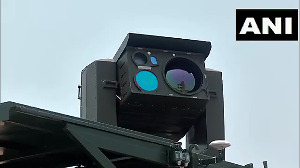Do you have mutual fund and personal finance-related queries?
Please ask your questions HERE and rediffGURU Janak Patel, a certified financial planner accredited by the Financial Planning Standards Board, India and CEO and founder of InfiniumWealth, will answer them.

Anonymous: Transitioning Back to India & Financial Planning. Hello, I’m currently in the process of transitioning back to India after spending the last 15 years abroad. My family includes my wife (early 30s) and our 1-year-old baby. We are staying with my parents for now but are planning to move into a larger, more comfortable residence, either by buying or renting. I’d love to hear some perspectives on my financial situation, as I’m trying to figure out the best course of action in this new chapter.
Here’s a quick summary of where I stand:
1. Cash Savings: We’re consolidating assets from both India and abroad, and will have about Rs 4 crore in liquid funds.
2. Retirement Savings: I have a PPF-equivalent account of around Rs 70 lakh, which I can only access at age 65. I’m hoping the modest returns from this will be sufficient for my retirement.
3. Inherited Assets: I’ve inherited ancestral properties valued around Rs 30 crore. I’m not planning to liquidate these assets or touch them for at least the next 10 years.
4. Career: I work in IT and expect a salary of about Rs 1.3 lakh per month (after tax) in India. My wife is in the early stages of her career, so we’re still deciding whether she will work here or possibly start her own small business.
Given all of this, here’s where I’m at:
- Investment options: I’m considering investing the Rs 4 crore in commercial real estate to generate passive income. I’ve seen a couple of properties with rental guarantees of Rs 1.5 lakh per month, with a 5% annual increase.
- Housing preference: My family prefers to live in a gated community, so I’m not really inclined to invest in residential property for passive income.
- Housing decision: Should I buy an apartment or villa now, betting on my career certainty here, or focus on creating more financial freedom first before making career moves in India?
In my heart, I feel that achieving financial independence should be my first priority before diving into career opportunities or starting a business here. What would you do in my situation? I'd love to hear your thoughts or any advice you can offer!
Hi, Welcome back to India and Congratulations on taking this big decision to move back to India.
Before I start my response to your queries, just want you to know we share a couple of things in common. I was abroad for a considerable time and returned to India and I was also in the IT field at that time, before I moved ship to Personal Finance and Financial Planning. So I can relate to some of your concerns, queries and thought process in that regard.
This may be a bit long but hopefully it is helpful.
Your current financial summary:
- Cash/Liquid funds - Rs 4 Crore
- PPF equivalent - Rs 70 Lakh available at age 65
- Inherited properties - valued at Rs 30 Crore no plan to liquidate as of now
- Salary/Income - Rs 1.3 lakh per month in hand
As a few critical data points are not mentioned but with few indicators in queries, I will make some assumptions for the same - Age 37 years, Location for housing/work - Metro/2nd tier city.
Let’s get a couple of things kept aside for this discussion:
PPF equivalent - Rs 70 lakh > for retirement can grow to an amount between Rs 2 Crore (@4% returns) to Rs 4.5 Crore (@7% returns); will cover this again when I mention retirement below.
Inherited Properties - as there is no plan for liquidation, excluding this completely.
Decisions to be made:
1. Investment Options
2. Housing Buy/Rent
3. Financial freedom/independence
Let’s go through each of these and I will add more for your consideration as they will have a weightage on all future decisions.
1. Investment Options
A. Commercial real estate with investment on Rs 4 Crore and return of Rs 1.5 lakh per month
Pros:
- Regular month income
- Commercial Real Estate asset
Cons:
- Return on Investment is 4.5% before reducing charges for maintenance, may be below 4% net in hand
- Rental Income is taxable (added to other incomes and taxed as per slab rate) expect highest tax rate of 30% as total income will exceed Rs 30 lakh (Salary + rent)
- All available funds will be deployed
Note: Commercial real estate appreciation is primarily based on location. Capital gains on Commercial real estate attract tax at 20% as of now.
B. Lets consider an alternative approach assuming investment is for a long term which is usually for real estate assets e.g. 20 years
Invest Rs 4 Crore in Mutual funds.
A well-diversified portfolio can generate 12% returns over the long term. The Corpus after 20 years will be over Rs 38 Crore.
But considering your requirement for a monthly income from this investment, let’s do another approach. Split your investments.
- Invest Rs 2 Crore in a well-diversified Mutual Funds portfolio expecting a 12% return - Corpus at the end of 20 years = Rs 19+ Crore
- For regular income, invest Rs 2 crore in Balanced Advantage mutual funds and considering a modest return of 10% (last 10 years data will show higher returns). Keep investment for 1 year before withdrawing to attract Long term Capital Gains tax (tax efficient approach). After 1 year you can receive Rs 1.5 lakh per month (increasing at 5% annually) for the next 20 years.
Pros:
- Investment generates higher rate of return, corpus growing/compounding at 12% return
- Regular month income
- Investment returns are more tax efficient
- Flexibility to deploy all or partial funds towards building a corpus
- Corpus can be liquidated in future much faster and easily than Real estate
Cons:
- No real estate asset
Recommendation: Approach B is recommended as this will provide liquidity and appreciation towards wealth creation. This will also provide availability of funds for a new venture as and when required if that becomes a viable option in the future.
2. Housing Buy/Rent
If you plan to stay in India for long and settle down (not clearly indicated considering career options), you can consider buying a house property. But if the work location is not what you believe to be the place where you would like to settle down, then start with a Rental option and over time reconsider location for buying option.
Buying Property
Pros:
- Asset is generated
- Stability of residence if/when self-occupied
- Some amount of tax deductions/exemptions can be claimed if Loan is taken
Cons:
- A large amount of funds required/blocked for full payment / partial payment (with loan)
- EMI on Loan reduces income/funds in hand
- EMI is much higher than rent
- Locked to the property, change will be expensive
Renting Property
Pros:
- Capital is not deployed immediately
- Rent can be claimed for tax benefits
- Provide opportunity to consider long term housing decision
- Difference between EMI and Rent can be Invested to generate a good corpus
- Flexibility to move jobs across locations
Cons:
- No Asset is generated
- Rent is an expense
- No sense of ownership in the house you stay
So in summary, the decision is more individual and how you perceive the house property as an asset. For flexibility to settle down in your career in India I can recommend to start with a Rental option and I am sure in a few years you will know where and what to buy (if at all) towards your house property. Also Location is again critical towards budget and type of housing to consider.
3. Financial freedom/independence
This is probably more important than we realise. With time if we accumulate debt through loans, and expenses, this is one goal which takes a back seat.
Assuming you have worked on the above two goals and finalised your options/approach for them, I would strongly recommend you plan your monthly expenses and cash in/outflows to understand what amount you have in hand that can be considered towards savings for the future.
With a long road ahead in your work life (another 20+ years), Asset allocation needs to be considered when planning to deploy your savings. Equity based investment can provide health returns for investments that are for more than 7 years and a well-diversified Mutual Fund portfolio can achieve this.
For requirements within 5-7 years do consider debt products to park your money and earn modest returns giving priority to liquidity and safety.
Few very important points are not mentioned but I would like to highlight and you should start considering them immediately.
1. Life Insurance: Buy a Term Life plan for yourself and once your wife starts earning, for her too. The amount needs to be calculated and my final recommendation (last para below) will cover this. Start with Rs 50 lakh and keep adding based on the financial plan.
2. Health Insurance: Buy a good coverage for Family (even though you may have some with your employer). Recommend to go up to 1 Crore (and there are multiple options Base cover + Top-up covers for this).
3. Emergency Funds: Keep aside at least 6-9 months of expenses as emergency funds in a safe and liquid investment e.g. Fixed Deposits.
4. Your child's education: Within another 1.5 years schooling (pre-primary) will start and the education expenses are not as easily managed now. They will require a plan as they escalate very quickly as the child moves towards higher levels of education. Education inflation is in the range of 12% ~ 15% on average. So depending on what you decide for the school/education institute, this becomes a considerable amount and if unplanned may erode your corpus very quickly.
5. Though you have mentioned Retirement briefly, the PPF-equivalent amount will not be sufficient for retirement. Retirement typically at 60 years of age demands a corpus to cover the next 20-25 years of lifespan. Considering inflation may be just getting covered by the modest returns on your Rs 70 lakh fund, you are definitely short on the retirement side.
As you can see we have not considered the inherited property in this discussion, it can have a considerable impact towards your over financial plan.
Though I have provided some responses to your individual queries, this will still need a more comprehensive Financial Planning.
Hence I strongly recommend you approach a Certified Financial Planner and go through the process to arrive at a financial plan which will be in sync with your Life plan. A CFP will take into account all aspects of your personal preferences and guide you towards various options and alternatives you can consider. The comprehensive Financial plan will include/cover all aspects of Investment management, Risk management (life and health Insurance), Retirement planning and Tax management - a tax efficient approach towards your requirements. Please remember just as Life is ever changing and evolving for each of us, so will your financial plan require the changes and evolution to stay relevant for you, and this is where a CFP will add the most value when you have a long association. A CFP will plan and re-plan your goals and its requirements over the years and provide options and recommend the amounts and product categories to consider for each of them.
Best wishes for you to settle down and hope the above has provided a start towards it.
- You can ask rediffGURU Janak Patel your questions HERE.
Disclaimer: This article is meant for information purposes only. This article and information do not constitute a distribution, an endorsement, an investment advice, an offer to buy or sell or the solicitation of an offer to buy or sell any securities/schemes or any other financial products/investment products mentioned in this QnA or an attempt to influence the opinion or behaviour of the investors/recipients.
Any use of the information/any investment and investment related decisions of the investors/recipients are at their sole discretion and risk. Any advice herein is made on a general basis and does not take into account the specific investment objectives of the specific person or group of persons. Opinions expressed herein are subject to change without notice.











 © 2025
© 2025